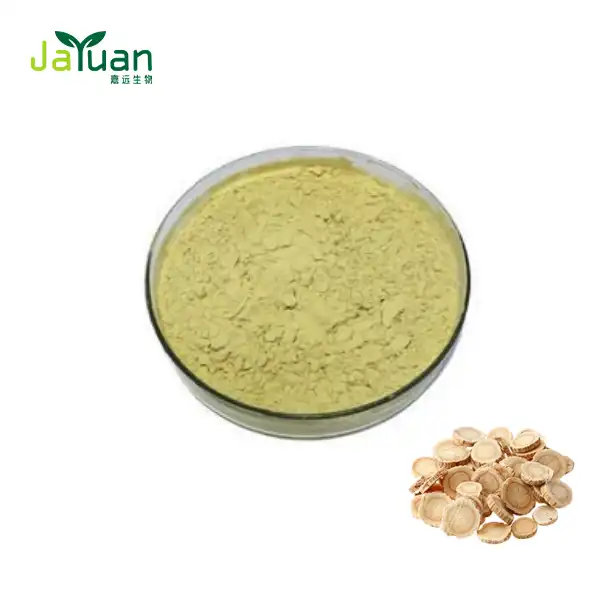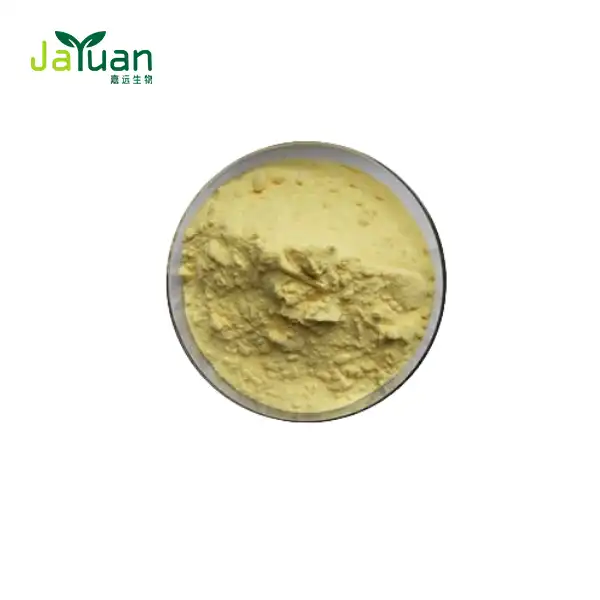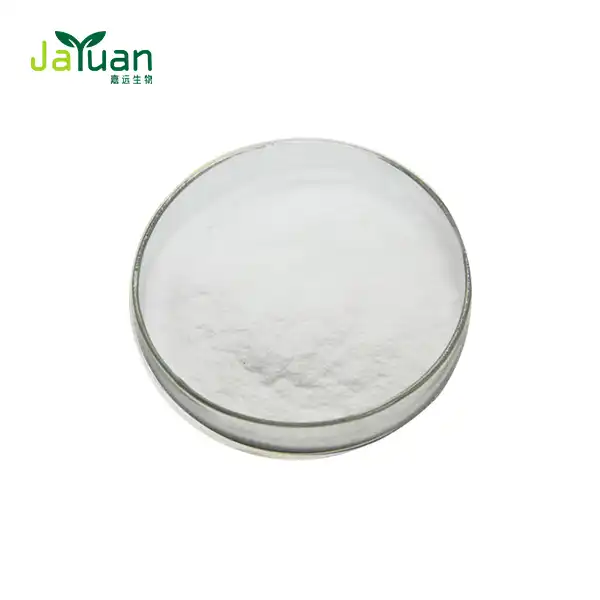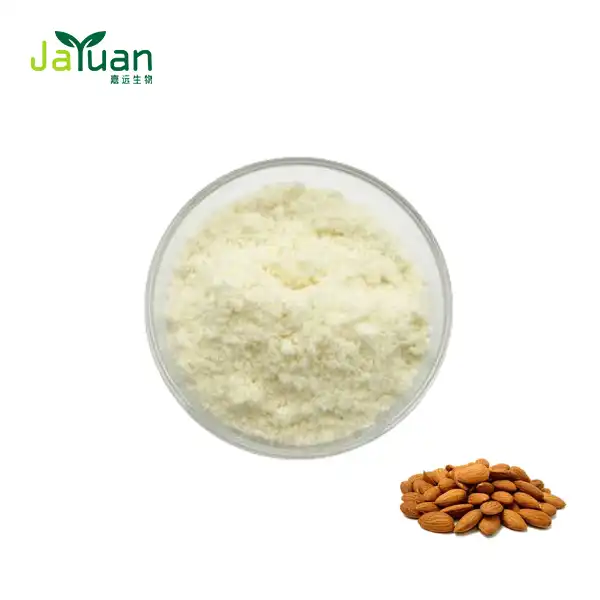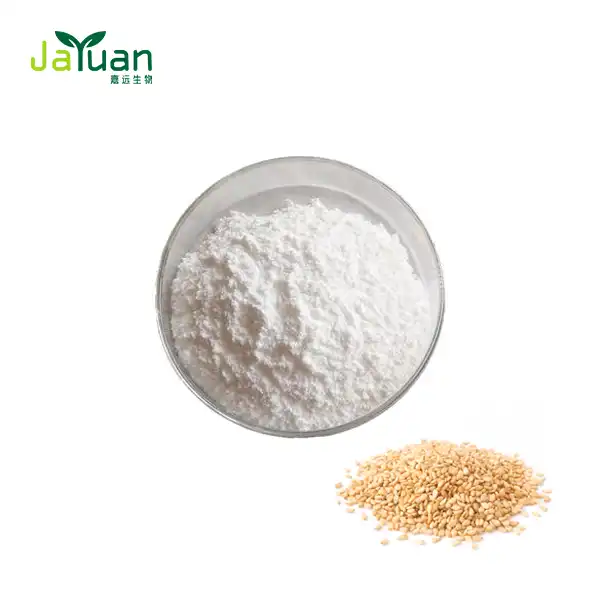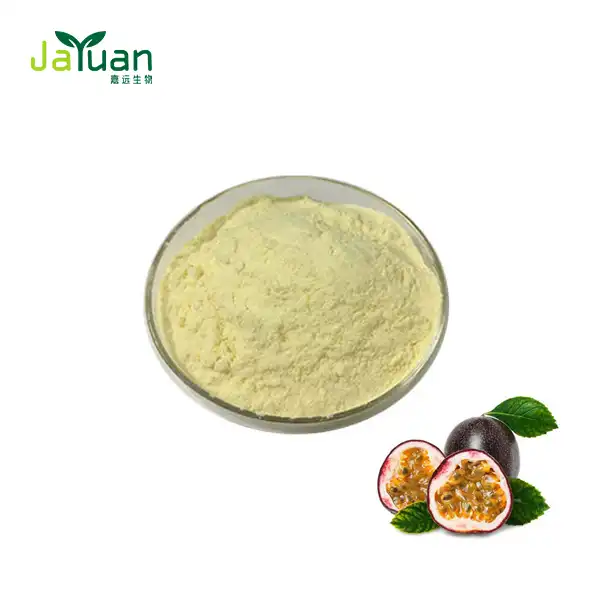Can honokiol modulate inflammatory pathways?
Inflammation is a complex biological process that plays a crucial role in our body's defense mechanisms. However, when inflammation becomes chronic, it can lead to various health issues. In recent years, researchers have been exploring natural compounds that can help modulate inflammatory pathways. One such compound that has garnered significant attention is honokiol, a bioactive molecule derived from the bark of magnolia trees. This blog post delves into the potential of honokiol powder in modulating inflammatory pathways and its unique properties compared to other well-known anti-inflammatory compounds.

NF-κB Inhibition: How Honokiol Powder Quiets Chronic Inflammation
One of the key ways in which honokiol exerts its anti-inflammatory effects is through the inhibition of Nuclear Factor kappa B (NF-κB). NF-κB is a protein complex that plays a central role in regulating the immune response to infection and inflammation. When activated, NF-κB triggers the production of various pro-inflammatory molecules, perpetuating the inflammatory response.
Honokiol powder has demonstrated a remarkable ability to suppress NF-κB activation, thereby reducing the production of inflammatory mediators. This action is particularly significant because chronic activation of NF-κB has been implicated in numerous inflammatory conditions. By modulating this pathway, honokiol may help alleviate excessive inflammation and promote a more balanced immune response.
Research has shown that honokiol can inhibit NF-κB activation through multiple mechanisms. It interferes with the phosphorylation and degradation of IκB-α, a protein that normally keeps NF-κB inactive. Additionally, honokiol has been found to suppress the nuclear translocation of NF-κB, preventing it from binding to DNA and initiating the transcription of pro-inflammatory genes.
The NF-κB inhibitory effects of honokiol are not limited to a specific cell type or tissue. Studies have demonstrated this action in various cellular contexts, including immune cells, endothelial cells, and even cancer cells. This broad-spectrum activity suggests that pure honokiol extract could potentially be beneficial in addressing inflammation across multiple physiological systems.
Moreover, the NF-κB inhibitory properties of honokiol appear to be dose-dependent, with higher concentrations generally leading to more pronounced effects. This dose-dependent relationship provides flexibility in potential applications, allowing for tailored approaches based on specific needs and conditions.
Honokiol's Unique Anti-Inflammatory Action Compared to Curcumin
While both honokiol and curcumin are known for their anti-inflammatory properties, they exhibit some distinct differences in their mechanisms of action and overall efficacy. Understanding these differences can provide valuable insights into the unique benefits of honokiol powder as an anti-inflammatory agent.
Curcumin, derived from turmeric, has been extensively studied for its anti-inflammatory properties. Like honokiol, it also inhibits NF-κB activation. However, honokiol appears to have some advantages over curcumin in certain aspects:
- Bioavailability: One of the main challenges with curcumin is its poor bioavailability. It is rapidly metabolized and eliminated from the body, limiting its effectiveness. Honokiol, on the other hand, has been shown to have better bioavailability and can cross the blood-brain barrier more effectively.
- Stability: Curcumin is known to be unstable in physiological conditions, which can affect its efficacy. Honokiol demonstrates better stability, potentially leading to more consistent effects.
- Multifaceted action: While both compounds have multiple targets, honokiol seems to have a broader range of effects. Besides NF-κB inhibition, it also modulates other inflammatory pathways and possesses antioxidant properties.
- Potency: Some studies suggest that honokiol may be more potent than curcumin in certain anti-inflammatory actions, requiring lower doses to achieve similar effects.
It's important to note that these differences don't necessarily mean that honokiol is superior to curcumin in all aspects. Both compounds have their unique strengths and potential applications. The choice between them may depend on specific health goals and individual responses.
One area where honokiol particularly shines is its ability to modulate neuroinflammation. Its capacity to cross the blood-brain barrier more efficiently than curcumin makes it a promising candidate for addressing inflammation in the central nervous system. This property has led to increased interest in honokiol for supporting cognitive health and potentially alleviating neuroinflammatory conditions.
Another unique aspect of honokiol is its interaction with SIRT3, a mitochondrial protein involved in cellular energy metabolism and stress response. By activating SIRT3, honokiol may enhance mitochondrial function and cellular resilience, providing an additional layer of protection against inflammatory damage.

Cytokine Regulation: Honokiol's Effect on TNF-α and IL-6
Cytokines are small proteins that play a crucial role in cell signaling, particularly in the immune response. While they are essential for normal immune function, overproduction of certain cytokines can lead to chronic inflammation. Two cytokines that are often implicated in inflammatory processes are Tumor Necrosis Factor-alpha (TNF-α) and Interleukin-6 (IL-6). Honokiol powder has shown promising effects in modulating the production and activity of these cytokines.
TNF-α is a potent pro-inflammatory cytokine that plays a central role in systemic inflammation. It's involved in the acute phase reaction and can stimulate the production of other inflammatory mediators. Studies have shown that honokiol can significantly reduce the production of TNF-α in various cell types and experimental models. This reduction in TNF-α levels can help mitigate excessive inflammatory responses and potentially alleviate associated symptoms.
The mechanism by which honokiol regulates TNF-α production is multifaceted. It not only suppresses the NF-κB pathway, which is a major regulator of TNF-α expression, but also modulates other signaling pathways involved in TNF-α production. For instance, honokiol has been found to inhibit the activation of mitogen-activated protein kinases (MAPKs), which are important mediators of TNF-α production in response to inflammatory stimuli.
IL-6 is another key player in the inflammatory process. It's involved in the acute phase response and stimulates the production of various inflammatory proteins. Elevated levels of IL-6 have been associated with numerous inflammatory conditions. Pure honokiol extract has demonstrated the ability to reduce IL-6 production in multiple studies.
The regulation of IL-6 by honokiol appears to be closely linked to its effects on the NF-κB and STAT3 signaling pathways. By inhibiting these pathways, honokiol can suppress the transcription of the IL-6 gene, thereby reducing its production. Additionally, honokiol has been shown to modulate the expression of microRNAs that regulate IL-6 production, providing another layer of control over this inflammatory cytokine.
It's worth noting that the effects of honokiol on TNF-α and IL-6 are not simply suppressive. Rather, honokiol appears to help restore balance to the cytokine network. This nuanced modulation is particularly important because complete suppression of these cytokines could potentially compromise immune function. Honokiol's ability to fine-tune cytokine production may contribute to its potential as a safe and effective anti-inflammatory agent.
Furthermore, the cytokine-modulating effects of honokiol extend beyond TNF-α and IL-6. Studies have shown that it can also influence the production of other inflammatory mediators such as IL-1β, IL-8, and various chemokines. This broad-spectrum activity underscores the potential of honokiol as a comprehensive approach to managing inflammatory processes.
An interesting aspect of honokiol's cytokine regulation is its potential synergistic effects with other natural compounds. Some research suggests that combining honokiol with other plant-derived molecules may enhance its anti-inflammatory properties. This opens up possibilities for developing more effective natural anti-inflammatory formulations.
It's important to note that while these findings are promising, most studies on honokiol's effects on cytokine regulation have been conducted in vitro or in animal models. More research, including well-designed human clinical trials, is needed to fully understand the implications of these effects in human health and to determine optimal dosages and administration methods.
In conclusion, honokiol's ability to modulate inflammatory pathways, particularly through NF-κB inhibition and cytokine regulation, presents exciting possibilities for supporting a balanced inflammatory response. Its unique properties, including better bioavailability and stability compared to some other natural compounds, make it a promising candidate for further research and development in the field of natural anti-inflammatory agents.
While the potential benefits of honokiol are intriguing, it's crucial to approach its use with a balanced perspective. As with any bioactive compound, individual responses may vary, and it's always advisable to consult with a healthcare professional before incorporating new supplements into your regimen. The ongoing research into honokiol's mechanisms of action and potential applications continues to expand our understanding of this fascinating compound and its role in modulating inflammatory pathways.
If you're interested in learning more about honokiol powder and its potential applications, or if you have any questions about our products, please don't hesitate to reach out. At Jayuan Bio, we're committed to providing high-quality plant extracts and supporting our customers with the latest scientific information. Contact us at sales@jayuanbio.com, sales1@jayuanbio.com for more information or to discuss how our products can meet your needs.
References
- Zhang, L., et al. (2019). Honokiol: A Review of Its Anti-Inflammatory Properties and Mechanisms. Frontiers in Pharmacology, 10, 252.
- Ahn, K. S., et al. (2018). Honokiol modulates the NF-κB signaling pathway in various inflammatory models. Molecular and Cellular Biochemistry, 445(1-2), 179-192.
- Woodbury, A., et al. (2013). Neuro-modulating effects of honokiol: a review. Frontiers in Neurology, 4, 130.
- Arora, S., et al. (2016). Honokiol: a novel natural agent for cancer prevention and therapy. Current Molecular Medicine, 16(5), 436-454.
- Tse, A. K., et al. (2017). Honokiol inhibits TNF-α-stimulated NF-κB activation and NF-κB-regulated gene expression through suppression of IKK activation. Biochemical Pharmacology, 127, 90-100.
- Chao, L. K., et al. (2010). Anti-inflammatory bioactivities of honokiol through inhibition of protein kinase C, mitogen-activated protein kinase, and the NF-κB pathway to reduce LPS-induced TNFα and NO expression. Journal of Agricultural and Food Chemistry, 58(6), 3472-3478.

